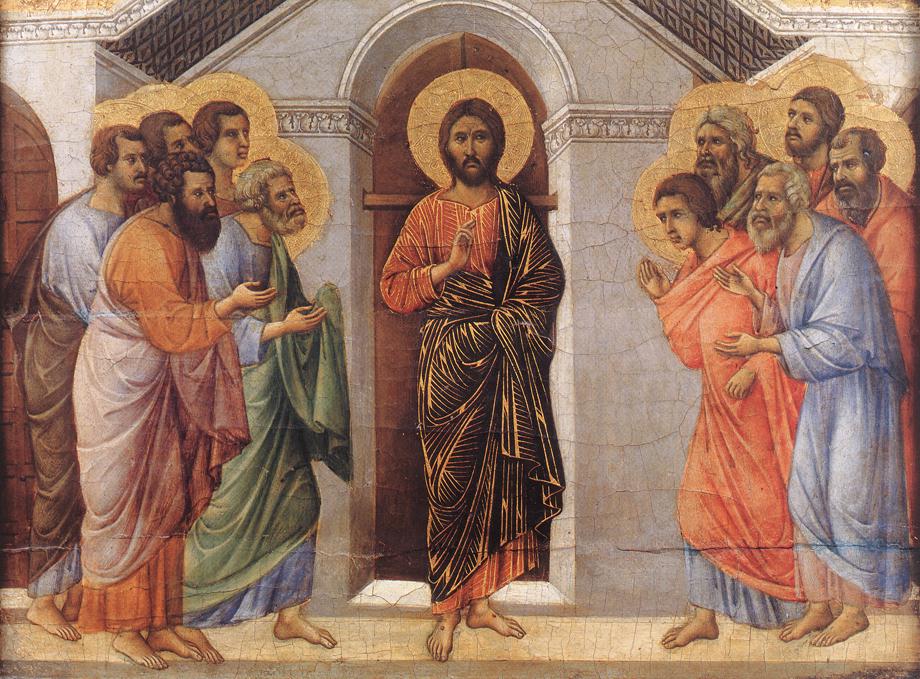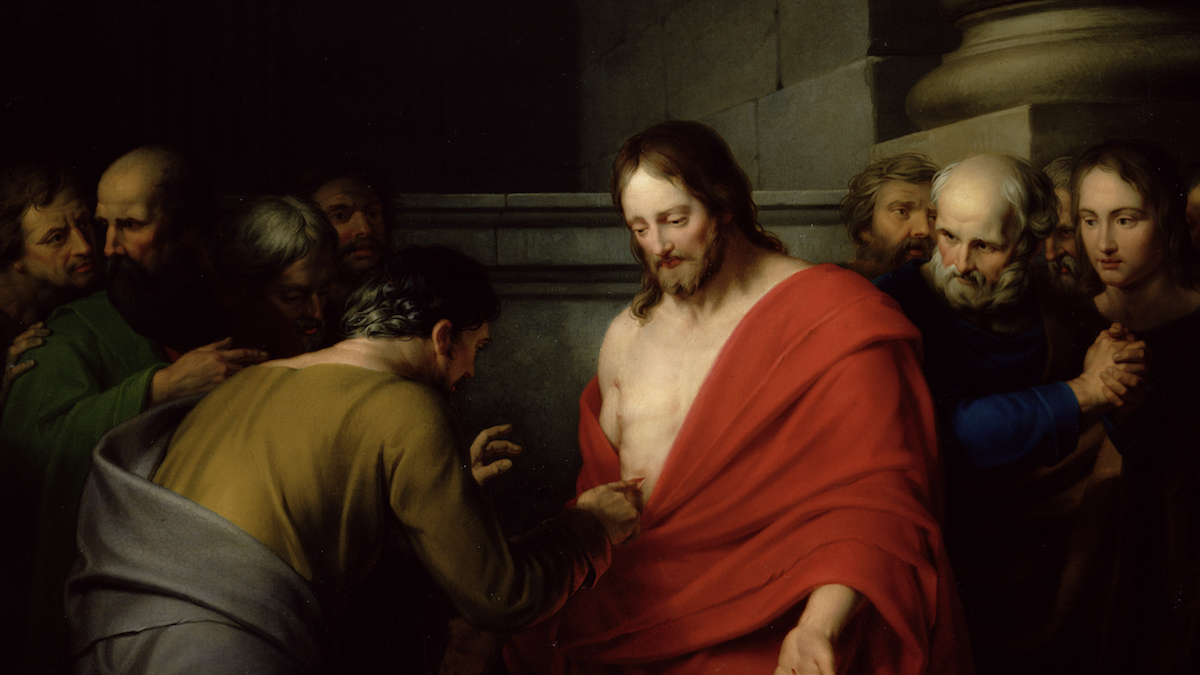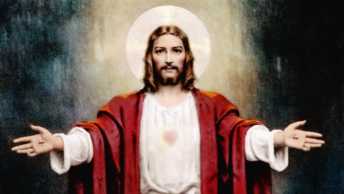When it comes to delving into what the Scripture readings we just heard have to offer us I am going to do something different today. I am going employ a technique used by the Early Fathers of the Church, writers and thinkers such as St. Augustine, St. Ambrose, St. Cyprian and St. Gregory the Great and many others. One of their favorite techniques was to go behind the literal sense of these scriptural accounts and find a spiritual sense they can offer us in order to build up and enrich our relationships with God.
So let’s look at today’s Gospel account from an allegorical perspective. We need to note that this is a passage from St. John’s gospel and that he extensively used symbols while playing on themes of light and darkness, spirit and flesh, times of day, and so forth in writing his gospel. It begins with: On the evening of that first day of the week, when the doors were locked where the disciples were for fear of the Jews, Jesus came and stood in their midst and said to them: “Peace be with you.”
Evening is the time of oncoming darkness but nevertheless there was some light still present. The minds of the disciples were smothered by darkness and fear over the terrible events of the previous three days. They were paralyzed and locked up in fear even though Mary had run to Peter to tell him of her encounter with Jesus risen from the dead. There was a glimmer of light and hope in her message but evidently they were still oppressed until Jesus miraculously appeared in their midst with His reassuring greeting, “Shalom.”
The question presents itself to us: What smothers us with fear? In what ways are our souls locked up and hidden within ourselves? God wants us to be gloriously alive and to walk in the freedom of His sons and daughters but all too often we, immobilized in our fears, keep Him at a distance from us. Perversely we distance ourselves from the One in whose power we can live truly free from all in this world that would deaden us.
Moving on, how, we ask, could the risen Christ’s body pass through a locked door? We don’t know how any more than we know how His body could walk on water to come to those disciples when they were gripped by fear of the storm that tossed them around in their boat on the Sea of Galilee. The real question is not “how?” The real question is “why?” for what reason?
There are several answers, the chief one being that God loves us and will not allow Himself to be locked out of our hearts. There is only thing that can keep God’s all-powerful love from having its effect in us and that is our own indifference, our neglect and lack of caring. If we simply do not care then nothing will happen and the chasm between God and us will not be bridged.
The next movement in this Gospel passage is that of Jesus sending them. “As the Father has sent me, so I send you.” And when he had said this, he breathed on them and said to them, “Receive the Holy Spirit. Whose sins you forgive are forgiven the, an whose sins you retain are retained”
I want to point out to you the huge significance here. Jesus Christ, the One sent by the Father, is now the One who is sending. Being a Christian necessarily involves “being sent.” You are here at Mass to receive Christ and then you are sent. That’s where the word “Mass” comes from. Missa in Latin means “sent.” The words “mission,” “commission,” and others carry with them the notion of being sent. You have come here to Mass not simply to receive but to be empowered to leave here and then give, to give the Presence of the Risen Christ and His Spirit to those around you.
Note that St. John was sure to tell us that Jesus breathed on His disciples and said: Receive the Holy Spirit. Who sins you forgive and forgiven them… That breathing takes us back to the creation account in the Book of Genesis where we find God breathing life into Adam’s body. That original action of God creating is now repeated here in God’s new creation on the first day of the week when Jesus conquered the power of death and opened heaven’s gates so we can enter, not just the Garden of Paradise but heaven itself and into the reality of God Himself.
“Let there be light,” God said, and the darkness was overcome. Here, on the evening of the first day of the week, God once again overcomes darkness, death, and chaos as He initiates His new creation. St. John, you see, has carefully chosen his words and the symbolic actions of our Blessed Lord in order to convey to us the profound enormity of what Christ’s resurrection is all about.
“Doubting Thomas” is a marvelous gift to us. I am ever so grateful that he, with all of his doubts, was a significant character in today’s Gospel account. We are so much like him — not inclined to believe in anything except what we can touch, taste, smell, or feel. We want concrete evidence and proofs that are beyond a reasonable doubt when it comes to accepting things and believing in them. Perhaps that’s why so many have problems with their marriages and their families. Perhaps that’s why our political processes are so messed up. We have lost faith in them.
I need to point out now that faith is not the result of proof. Faith and proof cannot exist in the same heart and the same time because faith is another aspect of love and love can never be proven, it can only be accepted. You love someone because you have faith in the person.
Thomas was given the gift to putting his hand into the side of Christ where the soldier’s lance had entered, and his fingers into where the nails had been driven. That gift, however, wasn’t just for Thomas, it was for us. Paradoxically, his doubt allows us to have faith.
Today’s Gospel passage ends with these words:
Now Jesus did many others signs in the presence of his disciples that are not written in this book. But these are written that you may come to believe that Jesus is the Christ, the Son of God, and that through this belief you many have life in his name.
I have often wondered what those other signs and wonders were but have come to realize throughout my years as a priest that I have seen them in you, God’s loved ones. I’ve seen miracles of new life and new beginnings in the lives of many if you and come to know that Easter is an on-going reality, not a one-time event.
In spite of all that is happening in the world and in the politics that surround us, do not be afraid. Jesus comes to us when we’re all locked up and immobilized and greets us once again with His “Peace be with you,” with His “Shalom.” “Receive my Spirit. As the Father has sent me, so I send you.”
Do not worry about what you are to say or what you are to do. If you are a person of prayer, if you give Jesus some of your quiet moments and stand ready to receive what He wants to give you, then you will be equipped to say and do what He sends you to do.
And above all, be generous in forgiving others. The measure you use in forgiving others will be the measure God uses in forgiving you. Being a Christian is not a matter of condemning others. It’s a matter of loving them so much that they will be redeemed, redeemed by the risen Christ who has conquered sin and death. “Blessed are the merciful,” said Jesus in giving us the Beatitudes, “for they will receive mercy.”
On this Mercy Sunday, Peace be with you!








